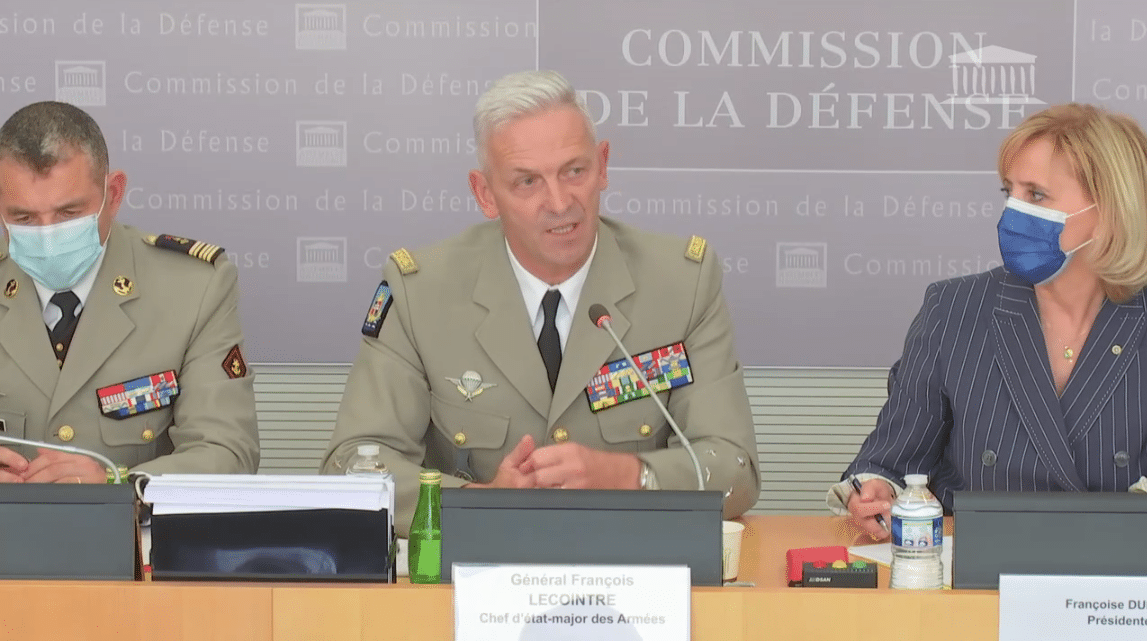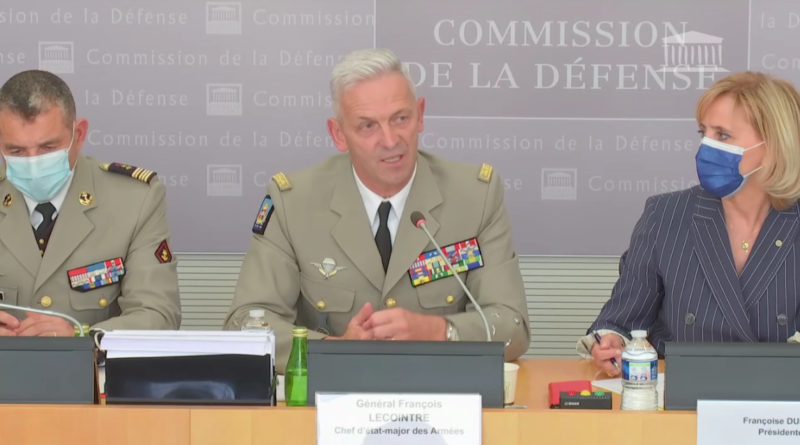An army that loses its uniqueness is an army that loses its effectiveness (General François Lecointre)
(B2) After four years of good and loyal service, the Chief of Staff of the French Armed Forces François Lecointre leaves his post. A man who has the art of thinking about the position of the military

- The Chief of the Defense Staff (CEMA), was before the Defense Committee of the National Assembly on July 7, 2021, around a fairly general theme: "the place of the armies in French society and the singularity military ". A theme, which allowed him to develop his personal ideas. Not without emotions.
- François Lecointre will have lived through a tormented period. He first had to reassure the military after President Macron's loud ousting of his predecessor, General de Villiers. He then had to face a period of Covid-19 which was not easy.
- Finally, he had to manage the procrastination of the executive on the transformation/closure of the Barkhane operation in the Sahel, and to undergo the fire of several stands of soldiers in the violent tone against the authority of the State. Which was tiring.
Military art and discipline
Of military art and the art of a civilization
Military art has a central singularity according to General Lecointre. " A society is developed and built around the military fact and around the relationship to violence and force. "" It is from the moment when we can begin to distinguish a civilian from a soldier, from the moment when we can tell someone that you will no longer be in charge of the implementation of this force, because another order is in charge of it, that a civilization can begin to be born. "" A distinction found in the medieval era between the Oratores (those who pray), the Laboratores (those who work), and the Bellatores (those who wage war). »
A very strict discipline towards politics
In France, submission to the President of the Republic, head of the Armies, is claimed by General Lecointre. " Our honor as a soldier is to obey politics, it is an essential condition for the legitimacy of military action. ". This submission has a corollary: the very close association of the military command with the elaboration of the decisions of the political power. With a key point: ethics. A soldier may question the legitimacy of the act he has to perform.
With a corollary: close association with decisions
Obedience should not be blind but intelligent, which presupposes a very detailed knowledge of politics. Each military echelon must maintain a margin of appreciation and manoeuvre, bearing in mind the final objective sought. The soldier must therefore be able to dispute, discuss the order ". But once" the order received ", it must be executed with the " last of the rigors ". A demanding discipline also for the President of the Republic who " must know how to get into this debate ».
A permanent ethic
Killing is not easy. " Asking to break this absolute taboo is extremely complex " and " requires an ability to control this violence (1). It passes " by a permanent ethic which is at the heart of the military singularity » whose keystone is « to kill on command, at the risk of his own death”. " It goes through an ability to expose oneself to danger because I will only kill knowing that I am risking my life. ».
die for his country
A soldier does not accept to die for his country "But" to kill for his country ". Such a hard thing to do” that in reality he accepts the risk of his own death and that by putting it forward he tries to re-establish a deontological symmetry between the death he gives and the death he accepts to receive ».
Rediscover the military singularity
An army that becomes civilized
In France, the armies have been built according to operational logics that have nothing to do with civilian logics, to allow reactivity and a rapid rise in power. But politicians changed their strategy after the Cold War. " As a measure of economy and profitability, [we have] aligned the organization of the armies with that of the civilian world; we have lost this pyramidal organization, we have lost the logic of stock ". " This civilianization (2) is partly linked to a vision of strict economy without measuring the effects, in particular by separating the support of the command and the units ". There is also another reason, more political ": the army can be seen as dangerous, " because it would be a temptation to Caesarism, and could lead to too strong an executive », echoing a « old debate between republicans and monarchists ».
The danger of trivialization
Gold, " an army that loses its singularity is an army that loses its effectiveness ". This trivialization took place all the more easily "that the army has become" like that of the Second Empire ", an army of " expeditionary force ". Faced with threats, an army which is only an expeditionary force army is not capable of defending its country », warns the general for whom it is necessary « absolutely "reconstitute this military singularity" in all its dimensions ". NB: a point that comes up several times in his presentation.
Does France have the capacity to be a strategic actor
To be a strategic player, you have to a vision, a will and capacities ". France " is one of the only countries in Europe - with Great Britain - to have a vision ". It is based on " a multipolar international order with power relations that are balanced between its poles and regulated by international law ". In this environment, several powers are needed and Europe must be one of these powers ". France has the ability to express this will and develop this vision », Considers the army general. The White Paper, the strategic review and the military programming law (LPM) are “ vision building exercises ". " We have an ability to develop a vision in the military, geopolitical and international field that is truly stunning and unique in Europe ».
A European awareness in progress
To increase capacities in Europe, “ we must rely on the awareness that Europeans are beginning to have in geopolitical matters. " We will disappear if we do not switch to the second phase of geopolitical construction of the European Union ". The general thus salutes the progressive awareness in Europe “Issues that endanger European security and its prosperity ».
The army of the future
The demographic question
The questions " environmental and demographic ", in particular, lead to a " obligation "for Europeans to help African countries in their development" on which our security absolutely depends ". It shouldn't be that " the doubling of the population by 2040 or 2050 results in great migration movements but on the contrary in the development of Africa so that people have a future at home ».
The future: knowing how to scale up beyond 260.000 men
« In reality, armies lack depth and organic thickness ". The current LPM (military programming law) does not allow to make a large mass army [but] it allows to consolidate a complete model, to restore the functions which were disappearing, to preserve skills ". Once this model has been preserved, safeguarded and modernized ", by 2030, the question of the rise in power will arise: " In how long and at what price am I able to move from an army of 260.000 men to a much higher combat engagement capacity? ».
A small army compared to China and Russia
« We are a powerful army certainly, but compared to China or Russia, we are a small army ". This will have to go through alliances. “Hence the interest of working with the Europeans on what we are able to set up to pool our efforts”. This includes having an ability to " operational cooperation » and in terms of « industrial and technological standards ».
(Agnès Faure, st., with Nicolas Gros-Verheyde)
- It is necessary to distinguish the forces of order " who only have the ability to kill in self-defense, that is, to protect a life that is being attacked — and the armed forces who have this formidable obligation to use force deliberately, including to the point of killing ". It is inherent in the rule of law: It can only be done when the nation, its very existence, is in danger ».
- Openness of the armed forces to the presence, even the interference of civilians.
À listen here : General Lecointre's appearance before the Defense Committee of the National Assembly. A real course in military philosophy.


